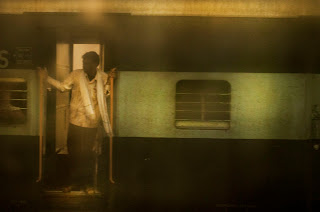This week on Friday Round Up the first solo exhibition by Australian photomedia artist, Niobe Syme, opens in Sydney, another masterful photo essay by GMB Akash that again proves the power of photojournalism as a voice for those marginalised and a fundraising event for the Ballarat International Foto Biennale.
Photo Essay:
GMB Akash – Yasan Galuh

Photographer GMB Akash has produced another incredibly strong body of work this time highlighting the terrible conditions in which those with mental illness are treated in Indonesia. At the Yasan Galuh Rehabilitation Centre for the Mentally Ill patients are denied the most basic of human rights. Chained and caged, forced to eat and sleep in the most unsanitary conditions, these men and women are subjected to unimaginable hardship. Akash says there are only 500 psychiatrists in Indonesia, a country with a population of more than 240 million, and as a consequence those with mental illnesses are marginalised. Uneducated and fearful of the demons that plague their offspring, families “hand over” the mentally disabled to Yasan Galuh’s “carers” who Akash says see themselves as healers. The images speak loudly for those who are silenced and are a sobering reminder that beneath the glittering lights of our modern cities there are many still living in the dark.





To read more and view the full photo essay please visit GMB Akash’s blog. This is a courageous work from a very insightful photographer. All images (C) GMB Akash
Exhibition:
Niobe Syme - Leaving Jodhpur
Interview Alison Stieven-Taylor

The cultural melting pot that is India has provided a creative wellspring for photographers for decades. Much of what we see today is what could be considered ‘modern’ India, but the exhibition “Leaving Jodhpur,” by Australian photomedia artist Niobe Syme captures a slower pace, evoking for me a sense of the India of colonial times.
The images in this exhibition were shot during a long train journey one summer across the state of Rajasthan from Jodhpur to Delhi, a trip in which Niobe had time to contemplate, and observe, away from the madding crowds. As the train made its way across Rajasthan Niobe says she was “struck by an underlying sensation of the parallels with Australia in terms of the warmer tones, the dusty feeling. That was a huge surprise to me, and took me back to Western Australia where I am from and images of Hill End and those sorts of mining towns. I wasn’t thinking of colonialism, but yes there is that sense of nostalgia and I think that part of what's happening is that Rajasthan is predominantly rural and time is different there, certainly compared with a big city such as Mumbai”.
She continues. “Actually when I look at the series, it is like a long held breath. The whole series Leaving Jodhpur, and not arriving anywhere, reflects the existential feeling of angst about being a foreigner in this vast place and not having any reference from the world I was from, other than my sense for humanity and ability to channel that through the lens”.
The natural filters the train windows provided - smudges, scratches, haze, dirt, dust and erratic obstructions, intrigued Niobe. “I was curious because everything wasn’t too available to me as a voyeur. The camera and eye sees so easily, but there is so much you can’t know in India. My intention was to try to communicate both the beauty of this place as I was seeing it at the time and to also establish an authorship in an honest way”.






From this journey Niobe says three strands emerged – landscape, people and buildings. “I didn’t take a whole lot of images, I think it wasn’t more than about 70 (there are 20 in this exhibition). Over time I am tending to take fewer images, which is interesting as with the digital format you can go to town, but becoming attuned to what it is you are feeling and developing a better sense of that kind of feedback, means pressing the trigger is more conscious”.
Niobe has made several trips to India in recent years and she and her family are working with the Sucheta Kriplani Shiksha Niketan (SKSN) School for physically challenged and disadvantaged children in Manaklao. “It is a very beautiful thing to spend time with these people, and the school is doing fantastic work in developing community attitudes about disability,” she says. Niobe contributes through visual and writing projects and says there is a team of Australians involved.
Also a poet, Niobe has written a poem entitled Leaving Jodhpur, which she plans to read at the opening of her exhibition. “I struggle to remember which came first,” she laughs. “The poem and the photographs are in a dialogue which is quite exciting creatively as one levers the other and it challenges me to investigate the subject matter from a slightly different angle. But they inform and inspire each other and overall where I am going with my work is to look at the dialogue between the two”.
Leaving Jodhpur
Arthere
126 Regent Street, Redfern
6-21 July
Opening 2pm Saturday 6 July
For more details on the exhibition and opening hours visit Arthere website
To view more of Niobe's work click here for the website
All images (C) Niobe Syme
Fundraising Event:
Ballarat International Foto Biennale

On Sunday 14th July, Eleven 40 Gallery in Malvern (a short drive from Melbourne's CBD) will host a fundraising event for the fifth installment of the Ballarat International Foto Biennale (BIFB). To find out how you can secure one of the 125 photographs up for grabs in this BIFB RED DOT promotion, and help the Festival raise much needed funds, please visit the link here.
Until next Friday, take care wherever you are.
No comments:
Post a Comment